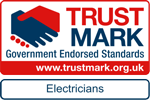Who needs to comply and why
In 2005 the Government introduced electrical safety rules into the Building Regulations for England and Wales.
Part P states that anyone carrying out electrical installation work in a home must make sure that the work is designed and installed to protect people from fire and electric shocks.
Part P came into force to ensure all electrical work carried out within a dwelling – a home or garden is carried out safely by a qualified electrician and that building control is notified of this work. All electrical installation work in a home, garden, conservatory or outbuilding must meet the Building Regulations.
Check out this video on A Day in the Life of an Electrician - EICR Walkthrough, Periodic Electrical Inspection & Testing
FAQs
You must either:
• Tell your local-authority building-control about the installation work before it starts; or
• Employ an electrician who is registered with one of the Government-approved Part P schemes.
The advantages of using a registered electrician are:
• You will not have to pay any building-control charges
• The Electrician can deal with everything for you
• The Electrician will arrange for you to receive a certificate that confirms the work meets Building Regulation
A compliance certificate is required by the buyer’s solicitors to show that any electrical work carried out at the house on behalf of the vendor or seller is safe. In other words, failure to comply could have an effect on the future sale of the home and the onus is on the home owner to ensure the work has been notified.

To help homeowners meet their obligations under the Building Regulations, ELECSA registered contractors have been independently assessed annually to ensure that they are operating to the highest technical and professional standards. As such they can self-certify their work as being compliant with the Building Regulations. The ELECSA contractor notifies us of the work he has carried out and we will issue the building compliance documentation to you and the Local Authority in keeping with the requirements of Part P. This means that you do not have to pay the Local Authority for an inspection of the work. Once you have this documentation keep it safe as you will certainly require it if you plan to sell the property.
I have used JPH on many occasion and whatever the issue was I have found them extremely professional and reliable. The standard of work is exceptional and I would recommend them to anyone.
– Mrs D Bailey –





